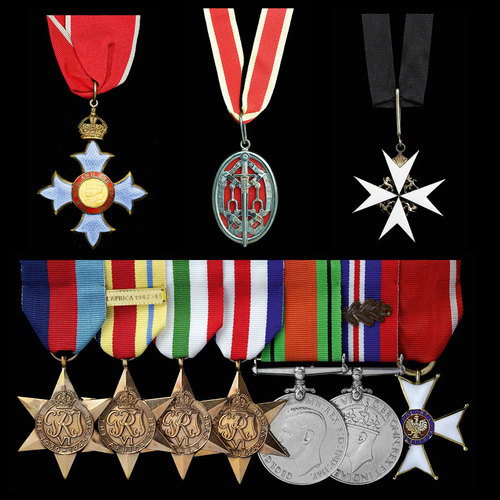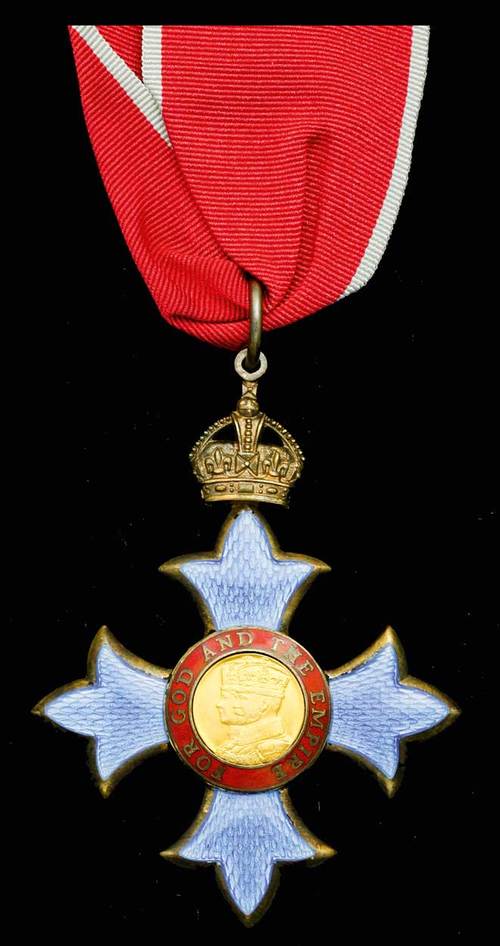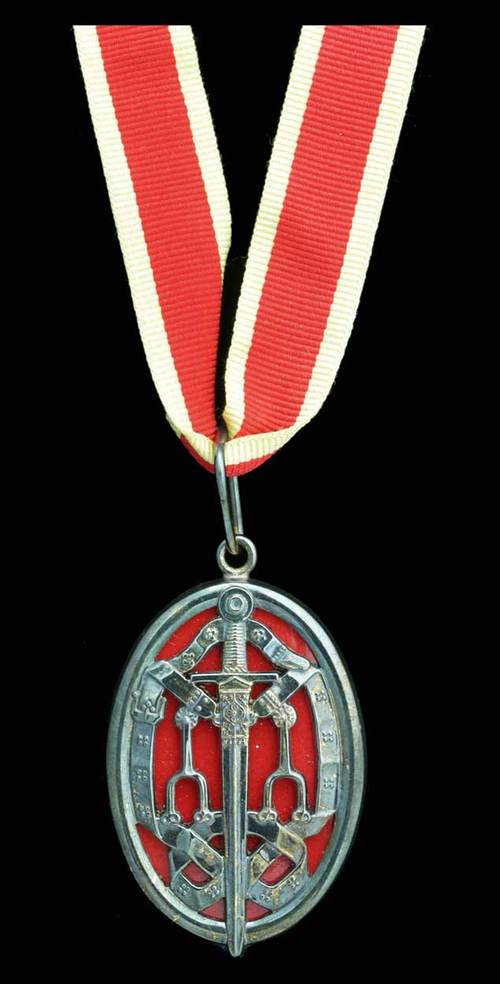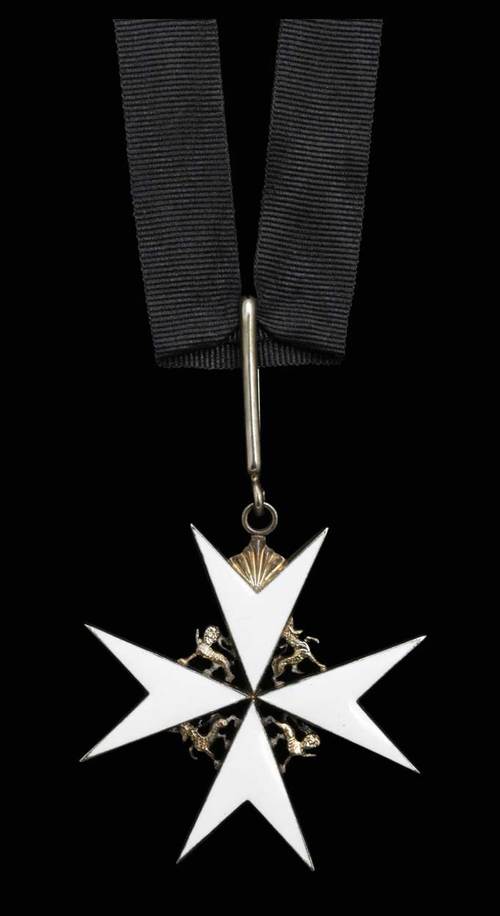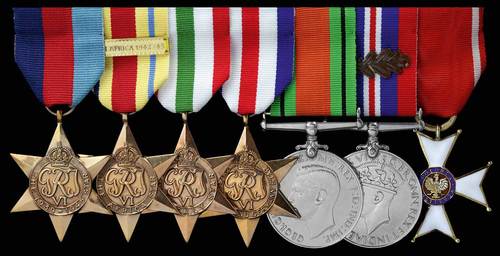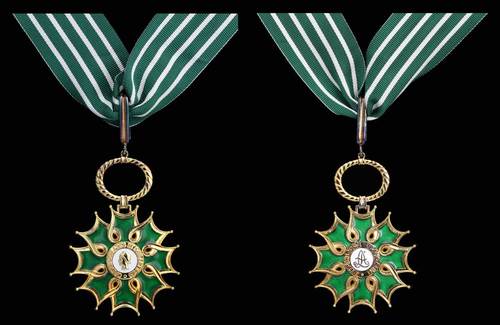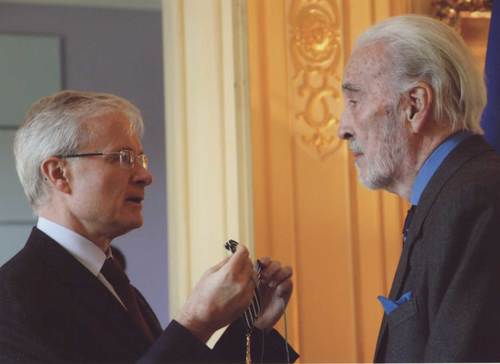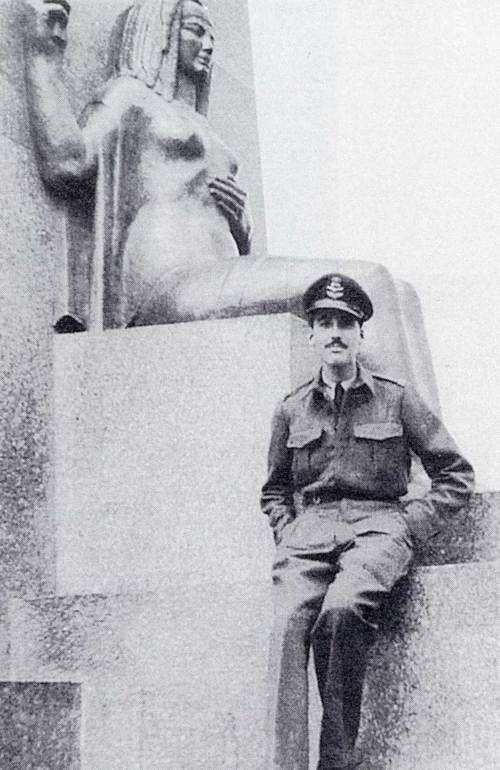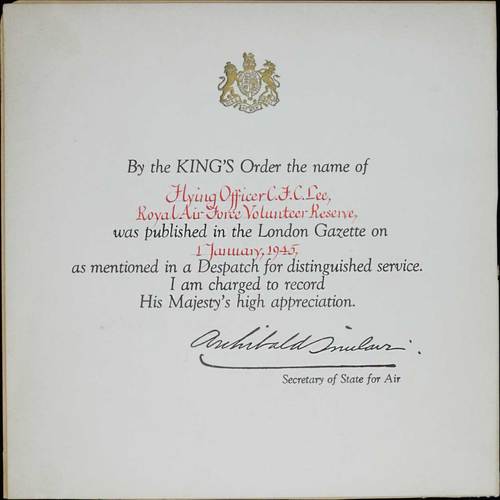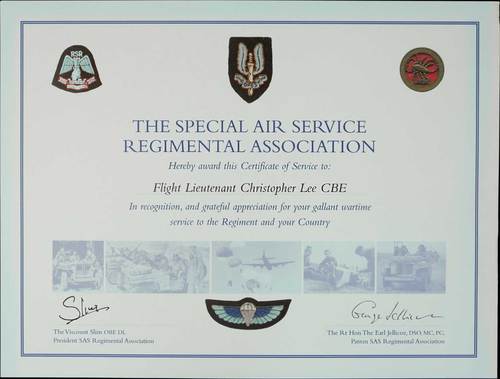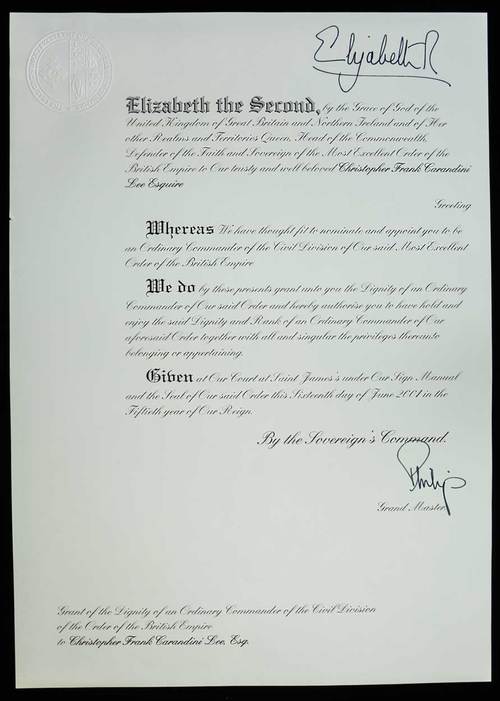Auction: 17047 - The Official Honours and Related Film Awards Bestowed upon Sir Christopher Lee, C.B.E., C. St. J. (1922-2015)
Lot: 1
A FOREWORD BY DAME HARRIET WALTER, D.B.E.
We Knew Him as Tio
If the phrase "star quality" had been known to me as a child in the 1950s I would most definitely have applied it to my uncle Christopher Lee, and not because of anything to do with his actual film stardom. For me his star quality existed off screen. I was forbidden to witness his professional stardom by the X rating attached to all his films, although in my early teens, with the collusion of my otherwise law-abiding grandmother, I did sneak in to the Notting Hill Coronet to see Dracula; Prince of Darkness wearing my older sister's high heels and a padded bra. Long before that he had impressed me as the romantic, roving uncle, who would fly in on occasional visits from faraway places. His presence always created excitement. The pulse of the entire family seemed to quicken, and life became more vivid at the sound of his voice when he entered the room. We were a captive audience for his exotic anecdotes and brilliant imitations, necessarily looking up to his 6'4" standing figure from our quickly improvised circle of armchairs or cushions on the floor.
My own passion for acting took hold at the age of nine, which may have been partly inspired by one or two visits to the Hammer Film Studios at Brae, where I was let loose on the sets of Pirates of Blood River but I remember it as a quite independent thought more to do with my crush on Hayley Mills than my uncle's influence. However by the time I was heading for Drama School I was very ready to attend a rather serious private audience with Tio (as we always called him) in which he tried to put me off the acting profession, painting a direful picture of its pitfalls even though he seemed to me to have avoided them quite successfully himself. I acknowledged his superior wisdom, thanked him and went right on and became an actor anyway.
Christopher was full of surprises. His looks could famously terrify, but he was a gentle and, I think, rather insecure man. He took himself seriously but was extremely funny. He could seem a bit uncoordinated but he was an excellent sportsman and did most of his own stunts. His school memories were more about sport than academe, but as an adult he was an eternal autodidact with a prodigious memory. There was very little he didn't know about opera and his own rich baritone voice could have led to a singing career if he had been able to afford the training. In his book Tall Dark and Gruesome he wrote eloquently about this and about his early life, the immediate family he grew up with, his days at Wellington College and how, like most young men of his generation, his youth was violently interrupted by the war.
He enlisted in the RAF but when he blacked out at a certain altitude he was forced to abandon that path. Instead he became an Intelligence Officer, in which role his un-English looks, his fluency in five languages and his bravery made him excellent material. To the day he died he never disclosed any details of the things he saw or the secrets he had kept, but I know they would have fed into his acting when he played out adventures in a safer form. The war strengthened his private inner core and his patriotism. His father and grandfather were military men and Christopher was deeply proud of his own wartime medals on sale at this auction.
Shortly after the war ended, de-mobbed and directionless, he had a chance meeting that set the course for the rest of his life. The Italian ambassador to the Court of St James who happened to be his cousin, suggested to him that with his looks and his voice he might think of becoming an actor. Some introductions were made and things took off from there, by no means instantly but fairly soon. The acting world must have seemed pretty trivial to him in those immediate years after the war, being put through various hoops at the Rank Charm School, but he emerged more than game to embark on an unconventional and fascinating career, the rest of which is history.
I am proud of his achievements but even more proud of his reputation as a gracious and gentlemanly team player. Sportsmanship was important to him and he was as excited to have been a friend of Mohammed Ali or played golf with Jack Nicklaus as by any encounter with a great actor or screen legend.
When he became a screen legend himself, gaining new generations of fans in his amazing Indian Summer, he never seemed quite to believe he had arrived.
Despite all the accolades and awards, there was a need to test himself that probably dated from childhood and never let him rest. He recorded an album of operatic arias and another with a Heavy Metal band, all in his 80s! Eventually ill health forced him to rest, but in one of my last conversations with him, shortly before he died aged 93, he complained about not having been offered a decent job in months!
I miss him like mad and I know my sister feels the same. With him has gone our last direct connection to our mother and grandmother, both strong influences on all our lives. My sister's children adored him. He was alert and interested in all of them, displaying his wonderful sense of humour and ease with the young, and we all treasure our continuing relationship with his widow Gitte. Personally, I miss our conversations. He always treated me as a peer, a fellow-actor to gossip with as if there were no big difference between our careers, while I never quite lost the feeling of the child looking up at him from that cushion on the floor.
IN SIR CHRISTOPHER'S OWN WORDS
"When you're involved in a war it's the old saying 'if your name's written on a bullet, there's nothing you can do about it'. So you just banished it from your mind."
"I've seen many men die right in front of me - so many in fact that I've become almost hardened to it. Having seen the worst that human beings can do to each other, the results of torture, mutilation and seeing someone blown to pieces by a bomb, you develop a kind of shell. But you had to. You had to. Otherwise we would never have won."
"Acting as a profession came to me by chance: in 1946, after the war, I was having lunch with my cousin, who was the Italian ambassador, and he asked, 'What are you going to do now you're out of uniform?' I said, 'I'm pretty inventive, and I can imitate people,' and he said, 'Have you thought about being an actor?'"
"There are certain things producers ask you to do, and when I was starting out, I said yes to everything. I was asked, for 'Quo Vadis,' to drive a chariot. I said, 'Oh yes. I'm licenced for all vehicles.' Two days later, I was sitting in this dustbin with two very aggressive horses. I didn't stay in it for long."
"I was always fascinated by fairy stories, fantasy, you know, demons, necromancers, gods and goddesses, everything that is out of our kin and out of our everyday world. I was always interested in enchantment and magicians and still am."
"Lon Chaney and Boris Karloff didn't like the word 'horror'. They, like I, went for the French description: 'the theatre of the fantastique.'"
"Peter [Cushing] and Vincent [Price] made some wonderful serious movies but are only known for horror. That was why I went to America. I couldn't see anything happening here except a continuation of what had gone before. A couple of friends, Dick Widmark and Billy Wilder, told me to get away from London otherwise I would always be typecast."
"I lived for 10 years in Los Angeles, and the one element that surpasses everything else - that you are very conscious of - is fear. You can smell it."
"Ian Fleming was my cousin, and he wanted me to play Dr. No, but by the time he got around to remembering to tell the producers, they'd already cast someone else. Spilt milk!"
"I'm still asked a great deal about 'The Wicker Man' because it's become one of the great cult movies of all time. That's the story of my career, really, making cult movies. And I've always said it's the best film I've ever made."
"I haven't spent my entire career playing the guy in the bad hat, although I have to say that the bad guy is frequently much more interesting than the good guy."
"The most important film I made, in terms of its subject and the great responsibility I had as an actor, was a film I did about the founder of Pakistan called 'Jinnah.'"
"I think acting is a mixture of instinct, imagination and inventiveness. All you can learn as an actor is basic technique."
"Every actor has to make terrible films from time to time, but the trick is never to be terrible in them."
"We don't always get the kind of work we want, but we always have a choice of whether to do it with good grace or not."
"I did radio, I did television, I did opera, I did films in which I had very, very little to say. But I had a lot of experience in front of the camera, and that's what really counts."
"Making films has never just been a job to me, it is my life. I have some interests outside of acting - I sing and I've written books, for instance - but acting is what keeps me going, it's what I do, it gives life purpose."
"Acting is like a snowstorm or perhaps a large empty vacuum. I'm not deluded by the fact that I'm getting all these offers for work, I'm very happy about it, but I know also that there is the other side and who knows, next year, they may not offer me anything. You never know."
"Once asked if he felt wearied by the constant onslaught of autograph seekers, actor Gregory Peck replied that he would be more worried when they stopped asking."
"I've worked with Tim Burton five times, and it's just like being part of a family; life doesn't get much better than that."
"A whole new career opened up for me when I was in 'Lord of The Rings' and 'Star Wars.'"
"When I first read "Lord of the Rings", I wanted to see a film of it. But at that time, the technology wasn't there, there was no such thing as CGI."
"Somebody once asked me how I found Peter Jackson and I said: 'Well, I parted his hair, and there he was.'"
"Peter Jackson's instincts are extraordinary, as is his stamina."
"The thing I have always tried to do is surprise people: to present them with something they didn't expect."
"I associate heavy metal with fantasy because of the tremendous power that the music delivers."
"What's really important for me is, as an old man, I'm known by my own generation and the next generation know me, too."
"I'm much softer than people think. I don't present to the world an emotional face. I'm pretty good at self-control, but I am easily moved."
"The secret to a long marriage in the film industry? Marry someone wonderful, as I did. And always have her come along on location."
A FEW OF MANY TRIBUTES
'A great British actor of the old school. A true link to cinema's past and a real gentleman.'
George Lucas
'A scholar, a singer, an extraordinary raconteur and of course, a marvellous actor … I was lucky enough to work with Chris on five films all told and it never ceased to be a thrill to see him on set. I remember him saying on my 40th Birthday (he was 80 at the time), "You're half the man I am." Being half the man Christopher Lee is, is more than I could ever hope for. He was a true gentleman, in an era that no longer values gentleman.'
Peter Jackson
'I think of him every day, and I always will. We both wished that we'd been able to work together more, but it was a joy to make Hugo together. He was a great actor, a wonderful friend, a real professional … At a certain point they realised what a treasure they had, and they made him Sir Christopher. And that's as it should be.'
Martin Scorsese
'What a sad day for the world to lose this incredible actor and human being.'
Bryan Adams
'An extraordinary man … an icon, and a towering human being.'
Elijah Wood
'He was the last of his kind - a true legend - who I'm fortunate to have called a friend. He will continue to inspire me and I'm sure countless others for generations to come.'
Tim Burton
'It is terrible when you lose an old friend, and Christopher Lee was one of my oldest. We first met in 1948.'
Roger Moore
'The best in the Biz.'
John Belushi
'A great actor, a great star, a surprisingly good singer and a lovely man.'
Jonathan Ross
'The great, always criminally underrated Sir Christopher Lee has left us. A Titan of cinema and a huge part of my youth.'
Mark Gatiss
'An amazing gentleman who brought us so many iconic roles.'
Reece Shearsmith
'The thing about Christopher Lee being dead is that it doesn't immediately strike you as being much of a career setback. For as long as he was an actor, his characters often exuded not immortality, exactly, but a kind of ennobled deathlessness.'
Robbie Collin
INTRODUCTION
'… a warm and wonderful human being and a master of his craft.'
Vincent Price: 'This Is Your Life: Christopher Lee'; Thames Television, 1974.
Initially dismissed as being too tall to be an actor, Christopher Lee was - by the end of his very long life - widely, and rightly, regarded as a towering figure in his chosen profession.
At least 6'4" tall, aquiline of feature, with an instantly recognizable baritone voice and a commanding presence, Lee had become, by the late 1950s, an actor of iconic status in the film genre with which he was first most closely associated. To quote Vincent Price again, from 1974, Lee was,
'… a man who has made a magnificent contribution to a very classic genre of the cinematic art: the horror film.'
Nearly forty years after Price spoke those words on British television, their subject was still receiving unstinted praise. By then, though, that praise came from younger generations of admirers from within and outside his profession and reflected his seamless transition from one cinematic genre to another: from cult-horror to science-fiction/fantasy. As Peter Jackson, who directed Lee in Lord of the Rings, wrote in his Introduction to the final edition of Lee's autobiography Lord of Misrule (2003), Sir Christopher was '… an icon; somebody we have grown up with.' Jackson wrote too of Lee's life having contained '… more surprises, laughter and human drama than could be found in any motion picture film.'
Sir Christopher's career was distinguished by numerous leading roles in a spate of Hollywood blockbusters, more often than not as a villain. From 'Scaramanga' in The Man with the Golden Gun (1974) to 'Saruman the Wizard' in The Lord of the Rings trilogy (2001, 2002 and 2003), the prequel The Hobbit - the Battle of the Five Armies (2014) and 'Count Dooku' in Star Wars: Episode II - Attack of the Clones and - Revenge of the Sith (2002 and 2005) he attracted an international audience of admirers. The list is endless and conjures up all manner of famous scenes, his closing - and memorable - 'Golden Gun duel' with Roger Moore's 'James Bond' among just one of them.
Yet Sir Christopher's early career included an equally impressive range of roles. In one of his many film duels, he crossed broadswords with Errol Flynn in The Dark Avenger (1955). In one take - as Flynn's double, a British Olympic sabre champion, withdrew from the scene - the Hollywood star threw himself at Lee, slipped and struck him a glancing blow on his right hand: the broadsword's blade nearly cut through Lee's little finger, which '… bled like a fountain'. As recounted by Lee in Lord of Misrule, Flynn's reaction was to exclaim 'Oh, f---!'. His bleeding opponent responded, with admirable restraint, 'Quite', but the finger was bound up and the duel continued; the finger remained bent for the rest of Lee's life.
For some - principally perhaps from the older generation of film-goers - Sir Christopher's portrayal of 'Count Dracula' in the Hammer Film Productions of the 1960s and '70s represent the quintessential Christopher Lee, as Vincent Price remarked in 1974. That said, some film fans consider his chilling portrayal of the pagan 'Lord Summerisle' in The Wicker Man (1973) to be one of his best performances: the film itself has acquired cult status and Lee's part in that process must be relevant. However, Sir Christopher regarded his portrayal of Pakistan's founder in Jinnah (1998) as among his best performances. By the end of his life, Sir Christopher expressed himself certain that it would be as 'Saruman' that he would be remembered, pronouncing the 'Lord of the Rings' films to be 'immortal' - and certainly involving filming techniques never previously achieved.
Of friendships made with fellow actors of all generations, the list is as long as it is distinguished but not perhaps as lengthy as his screen credits: the latter gained him an entry in The Guinness Book of Records. In fact Sir Christopher held all manner of records within the film world, among them 'tallest actor in a leading role' and 'most films with a swordfight'. In 2008, as a result of software developed by the University of Virginia - which mapped the working relationship between 1,250,000 actors in the Internet Movie Database - he was declared the most connected actor living 'at the centre of the Hollywood universe.'
In 2011, Sir Christopher Lee C.B.E., C. St. J., Commandeur de l'Ordre des Arts et des Lettres, already weighed-down with honours and awards, received the ultimate professional accolade for a British actor: Fellowship of the British Academy of Film and Television Arts (BAFTA). Elected to that Fellowship by his peers in the Academy, it was conferred in recognition of his immense contribution to film during a career of prodigious length, a career that was terminated only by his death.
In her Foreword, Dame Harriet Walter - Sir Christopher Lee's niece and an actor as respected by her peers as was her uncle - has summarised his life from a perceptively personal angle: little can be added to what she has said. So let us, instead, examine the awards constituting the lots in this catalogue: awards covering the last seventy years of his life - from wartime active service to his Fellowship of the British Film Institute, conferred in 2013, two years before his death.
As with the BAFTA and BFI Fellowships, many of the awards might be categorised as 'lifetime achievement' awards - a category that Lee himself wryly described as that of 'most promising veteran', adding in 2003 that, '… the real achievement is to have reached eighty through such a turbulent century and still be working.' And work he did: amassing in excess of 200 film appearances in a wide variety of roles between 1948 and 2014, there were very few years in which he was not working and in some years he participated in several films. In addition, he provided numerous voice-overs in several of the languages with which he was famously proficient and made substantial contributions to heavy metal music, one of many musical genres of which he was particularly fond.
All professionals value the respect of their peers: only they know what achievement involves. Actors attract admiration - sometimes shading into adulation - from those whom they entertain. Actors involved in charity work - and there are few who are not - receive due recognition for such selflessness. The extraordinary range of awards in this remarkable collection reflect all the above categories of recognition and exemplify the career and life of their equally remarkable recipient.
Of the lots in this unique auction, some are inevitably linked to Sir Christopher's later and famous roles in Star Wars and Lord of the Rings. Hence the inclusion of his Empire Award for 'Scene of the Year' in 2013 - 'Yoda's Duel - Star Wars Episode II: Attack of the Clones'. In the previous year he had received the Empire Award for 'Lifetime Achievement'.
It is the eclectic nature of the awards - together with their widely differing designs, materials and sources - that reflects the real the joy of the collection. One such is Sir Christopher's 'World Awards' Lifetime Achievement Award which was presented to him by Mikhail Gorbachev at a ceremony in Vienna in 2003: it comprises a finely cast bronze figure of a seated Atlas and weighs about eight kilograms. As its grateful recipient later recalled in Lord of Misrule, it was quite a struggle to carry his newly acquired honour off the stage: when '… the Pope received his, he very wisely made no effort to pick it up'.
In July 2008, Sir Christopher was awarded the splendid 'President's Crystal Globe' award at the 43rd Karlovy Vary International Film Festival; Robert de Niro was similarly honoured on the same occasion.
The diversity of the collection is further reflected in awards bestowed for Sir Christopher's well-known support of charitable causes. These include his UNICEF Award of 2012 and his 'Cinema for Peace' Awards of 2010 and 2014, both presented to him at ceremonies in Berlin.
Sir Christopher Lee may never have won an Oscar but, as the actor Nicolas Cage once observed, that didn't matter: because he was cool.
It doesn't come better than that.
CATALOGUER'S NOTE
First and foremost my thanks to Dame Harriet Walter. Her poignant and heartfelt words lend a unique touch to our understanding of a very special human being.
Special mention should also be made of Lady Lee's most generous offer to donate a percentage of the proceeds from the auction to Denville Hall, Northwood, the retirement home for actors and actresses.
In terms of photographic coverage much is available via such search engines as Google. For those interested in specific Film Awards, I would recommend Getty Images, for photographs exist of Sir Christopher receiving many of the awards described in the catalogue. Likewise, YouTube features a plethora of career appearances and interviews: these have been viewed by millions, his roles in Lord of the Rings and Star Wars - and latter day 'metal' performances - proving especially popular.
For someone used to cataloguing official Honours & Awards, it has been a fascinating journey off the beaten track. This is largely due to the extraordinary diversity of Sir Christopher's career, the scale of which is reflected in the eclectic nature of the Film Awards described below. Each bears testament to a special occasion in Sir Christopher's life and the same may be said for those awarded in recognition of his services to charity and good causes: such was the nature of the man.
For me, however, reference should be made to his official insignia and awards for, in respect of active service, they serve as a reminder of that wonderful wartime generation to whom we owe so much. As is well-known, Sir Christopher distinguished himself as an R.A.F.V.R. officer in the Second World War: he was mentioned in despatches.
As Dame Harriet observes in her Foreword, those wartime experiences 'would have fed into his acting when he played out adventures in a safer form. The war strengthened his private inner core and his patriotism. His father and grandfather were military men and Christopher was deeply proud of his own wartime medals on sale at this auction.'
This aspect of active service is one he shared with some notable British actors of his generation. One is reminded of David Niven, who saw action in Normandy in 1944; Kenneth More, who braved the Luftwaffe off Crete in 1941 and Richard Todd, who landed by parachute on D-Day.
Such experiences no doubt marked each of them in their own way, although a shared sense of justice and patriotism was evident in them all. No wonder that Sir Christopher - and they - will be held in high esteem for generations to come.
David Erskine-Hill
THE OFFICIAL INSIGNIA AND MEDALS
'For the winners, awards in the cinema are a substitute for curtain calls in the theatre, where actors have nothing further to say, but just bow, though in some countries they clap the audience. I clap the London Film Critics' Circle, and the London Evening Standard and Empire magazine. Plus a bow in the direction of the Royal Box: thank you, Ma'am, for the extra initials.'
Sir Christopher's Lord of Misrule, refers.
The Knight Bachelor's badge, C.B.E., C. St. J. and Second World War medals bestowed upon Sir Christopher Lee, including his mention in despatches
(i)
Knight Bachelor's badge, silver-gilt and enamel, in its Thomas Fattorini case of issue
(ii)
The Most Excellent Order of the British Empire (C.B.E.), Civil Division, Commander's 2nd type neck badge, silver-gilt and enamel, in its Toye, Kenning & Spencer, London case of issue
(iii)
The Order of St. John, Commander's neck badge, silvered-metal and enamel, in its case of issue; together with Officer's breast badge, silvered-metal and enamel, in its case of issue
(iv)
1939-45 Star
(v)
Africa Star, clasp, North Africa 1942-43
(vi)
Italy Star
(vii)
France and Germany Star
(viii)
Defence Medal 1939-45
(ix)
War Medal 1939-45, M.I.D. oak leaf
(x)
Poland, Polonia Restituta, breast badge, gilt and enamel, post-war manufacture
(xi)
France, Order of Arts & Letters, Commander's neck badge, gilt and enamel, in its Arthus-Bertrand, Paris case of issue, with a pair of lapel riband rosettes; together with an Officer's breast badge, gilt and enamel, in its Monnaie de Paris card box of issue, generally good very fine (Lot)
Sir Christopher was knighted for his services to drama and charity in June 2009, a distinction bestowed upon him by H.R.H. The Prince of Wales at an investiture held at Buckingham Palace; owing to his age, Sir Christopher was excused the usual requirement of kneeling and thus received his knighthood whilst standing.
See:
https://www.youtube.com/watch?v=9SDa3XC1Nyc
His award of the C.B.E. was announced in The Queen's Birthday Honours in June 2001, for services to drama. He had earlier been appointed an Officer of the Order of St. John in 1986 and was elevated to Commander in 1997.
Sir Christopher's Commander's insignia of the French Order of Arts & Letters was presented to him by the French Ambassador in London on 16 December 2011. He had earlier - in 2002 - been appointed an Officer of the Order; his post-war Polish award requires verification.
Getty Images:
british-actor-christopher-lee-stands-still-as-his-wife-birgit-lee-picture-id136013873
Active service
Sir Christopher's war commenced shortly after he departed Wellington College, where, by his own account, he was once beaten 'for being beaten too often'. He bore no grudges.
In 1939, in common with like-minded British youth, he volunteered to fight for the Finnish forces in the Winter War:
'Our idea was that we would rescue the Finns from the Russian invaders. Our surprised hosts affected to be delighted by this callow set of volunteers, and touched that we paid our own third-class fares. They gave us some white uniforms as camouflage in the snow, and took us up front to a perfectly safe area. We never saw any Russians, and went home after a fortnight. It was clear the Finnish army was doing rather well against the Russian colossus, without our help' (The Lord of Misrule, refers).
On his return home, and still too young to join the Armed Forces, Lee found employment in the City of London in 1940 - 'I minded the bombs less than the sirens, which always turned my stomach over' (ibid). He also joined the Home Guard and gained a name for himself as an expert knife thrower. When, later in the same year, he reached sufficient age, he volunteered for the Royal Air Force Volunteer Reserve (R.A.F.V.R.).
Selected for pilot training, he was embarked for South Africa where, in his penultimate flight before going solo in a Tiger Moth, he suffered from headaches and blurred vision. A failure of his Optic Nerve was diagnosed, and - to his bitter disappointment - he was permanently grounded. He subsequently applied for employment in R.A.F. Intelligence and, on completion of his training in Southern Rhodesia and South Africa, he was commissioned Pilot Officer in the R.A.F.V.R. in January 1943.
Posted as Intelligence Officer to No. 260 Squadron in North Africa, he commenced a protracted period of active service in which the squadron 'leapfrogged' between forward airstrips and lent valuable support to out ground forces, in addition to attacking strategic targets. As the Allied advance continued into Libya, through Tobruk and Benghazi, and thence through El Agheila and Tripoli, 260 Squadron averaged five sorties a day.
Close shave
Later still, in Tunisia, Lee was nearly killed during an enemy attack on 260's airfield. He takes up the story:
'When the first loud noise sounded I was standing on the edge of an airstrip with my back to a large gaggle of aircraft of all types and nationalities. I was staring into the distance trying to distinguish between the nothingness and remoteness. I spun round and saw a sheet of flame and a vast amount of black smoke. I was astounded. My first thought was that a plane had crashed. The second was that the Americans had made a mistake. These random theories were corrected by the sight of four Me. 109s diving. Their bombs were actually visible in the air! People were so little used to this they were waving rattles, which were meant only for gas attacks. Our ack-ack was shooting back, though it was nowhere near being in position. When some bombs landed a hundred and fifty yards away I began running like hell, hoping for a slit trench or something, left over from a previous campaign.
In fact a small vehicle appeared before me. I plunged beneath it. Unfortunately three other men also plunged, and we all banged in together like creatures in a cartoon. There wasn't room for more than two, so I pulled out and began running for another one. And another bomb landed. The grit and muck and sand from the blast caught me smack in the bottom. It was like being hit with a shotgun from thirty yards. The stuff penetrated and stitched my trousers to my buttocks.
The attack was over in ten minutes, but for me personally there was worse to come. I saw the MO, who patched me up and said brightly, 'Oh, it's a bit of a mess, but we'll soon put that right' … As it transpired he was wrong … I advanced to the enemy's last redoubt in North Africa with my arse on fire' (ibid).
Following the surrender of the Axis forces in North Africa in May 1943, Lee was advanced to Flying Officer and prepared for 260's deployment to the Sicily campaign. His part in those operations was curtailed by recurring bouts of malaria and he was evacuated to hospital in Carthage. He re-joined his squadron in Italy at the end of the year and, in early 1944, was seconded to the Army. An active period of service ensued alongside the Gurkhas of 8th Indian Army Division, including the Monte Cassino operations.
Lee returned to his squadron in time for the liberation of Rome, where he was re-united with his mother's cousin, who had fought in the Resistance.
Liaison Officer
In November 1944, he commenced a tour of duty as a Liaison Officer, initially being assigned to forward planning on a suspected German 'Alpine Fortress' which was believed to stretch from Southern Bavaria, across western Austria, to northern Italy.
For the final few months of his service, Lee, who spoke fluent French and German - among other languages - was seconded to the Central Registry of War Criminals and Security Suspects. It was in this capacity that he was tasked with helping to track down Nazi war criminals. Of his time with the organisation, Lee said, 'We were given dossiers of what they'd done and told to find them, interrogate them as much as we could and hand them over to the appropriate authority ... We saw these concentration camps. Some had been cleaned up. Some had not.'
A degree of speculation centres around Lee's time as a Liaison Officer in the period 1944-45, a period of active service about which he said little. But he clearly came in to contact with Special Forces, including members of 'Popski's Army'. An accompanying certificate would suggest additional contact with members of the Special Air Service and, in respect of his involvement in operations in Yugoslavia, he is likely to have liaised with members of the Special Operations Executive (S.O.E.). One thing is for certain: he was mentioned in despatches for his distinguished services (London Gazette 1 January 1945, refers).
Lee clearly knew about some of the more unpleasant aspects of war. A case in point would be his intervention during the making of a memorable scene in The Lord of the Rings. Peter Jackson, the director, readily accepted his specific interpretation of a victim's physical reaction to being stabbed:
https://www.youtube.com/watch?v=adJdBSdMGKU
By way of conclusion, Sir Christopher once observed:
'When the Second World War finished, I was 23, and already I had seen enough horror to last me a lifetime. I'd seen dreadful, dreadful things, without saying a word.'
Sold with the recipient's original C.B.E. warrant in the name of 'Christopher Frank Carandini Lee', dated 16 June 2001; mention in despatches certificate, in the name of 'Flying Officer C. F. C. Lee, Royal Air Force Volunteer Reserve', dated 1 January 1945; Special Air Service Regimental Association certificate in the name of 'Flight Lieutenant Christopher Lee, C.B.E.', and a French Order of Arts & Letters certificate in the name of 'Monsieur Christopher Lee', dated 4 April 2011.
Subject to 20% VAT on Buyer’s Premium. For more information please view Terms and Conditions for Buyers.
Sold for
£8,000

